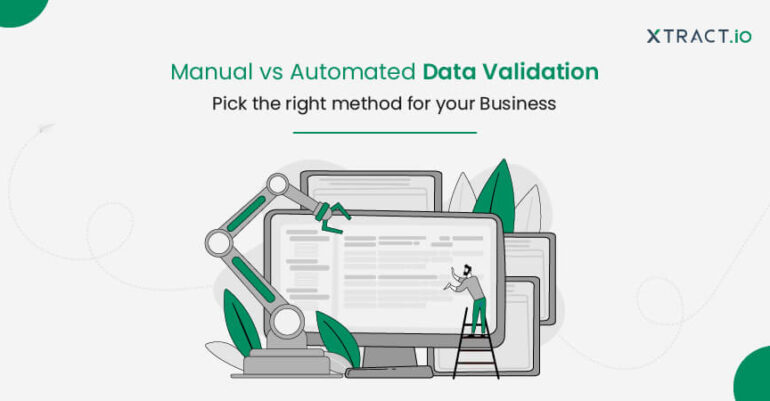‘Data is the new oil,’ says Clive Humby.
Businesses these days are dealing with large chunks of data. Data plays an increasingly important role in making decisions and businesses to perform better. And so, as a business, your data needs to be kept clean in terms of accuracy and quality.
Owning a clean database is every organization’s primary goal to ensure the company’s workflow. But there is a huge debate when it comes to manual versus automated data validation.
When we talk about data quality, both methods have pros and cons, just like two sides of a coin. Before concluding which one is a better way to validate data, let’s understand what data quality refers to and why it is essential for your business.
Data quality is the process of having clean data that is foolproof. It is considered based on specific data quality metrics like accuracy, quality, completeness, and also if it is updated in regular intervals.
Have you ever imagined what happens when you have poor quality data? Poor quality data hinders the growth of your business and impacts negatively on productivity.
The decision-making process becomes challenging, and the relationship with the customers gets affected. And that’s why data quality control is very important for companies, as owning the right data helps the business in almost every aspect.
Manual vs. Automated: Which is better?
A question like this is entirely dependent on your business and its type; however, there are few factors like time, quality, and accuracy when choosing one among the two. By nature, data exists in a physical form, and digitizing them and validating requires human involvement.
Simultaneously, you should also consider that giving a more considerable amount of data for manual verification might be time-consuming; you won’t be sure if it is error-free and cross-checking all the factors takes your time. This leads many organizations to opt for automated refresh services. And to name a few, like Worxtream and Mojo, helps to downstream and automate your workflow.
Key differences:
- Visibility and control:
The amount of data every business deals with today is enormous. This makes it difficult and time-consuming for employees to validate data manually without any promise of accuracy.
Companies should shift to automating the data validation process to save time and increase performance. Though the data is automated, what should go in, and what should be automated is controlled by humans.
- Time, effort, and expertise:
Automation makes everything systematic. Automating the data validation process helps in saving time that is spent on repetitive tasks. If the data validation process is automated, the employees can put their time and energy where they require their core skills rather than doing repetitive, time-consuming tasks.
On the other hand, when the task is performed manually, the speed will slow down, and the chances of making errors are high. According to research by Adestra’s Marketer vs. Machine, Marketers say that the biggest benefit of data automation is that it saves time by 74%.
- Efficiency and performance:
Automation of data validation not only saves a lot of human effort but also improves efficiency. And of course, it enables businesses to improve their performance. Automated data performance is extremely efficient when you set up logical rules to run the program automatically.
Performing data validation manually is not just a difficult task, but also it is prone to errors. In comparison, you need not worry about errors if you are automating your data. Data automation can help you upgrade your business to a whole new level.
- Research and validation:
A lot of manpower is spent on research, such as gathering addresses, phone numbers, and other details while manually validating the data. It takes hours for an employee to work on it, research, and clean the data. But when it comes to automated data validation, the turnaround time is much faster while validating. Without missing the efficiency of the work, the capacity of data validation also increases.
- Human intervention:
One reason for any business to automate data validation is that it helps humans eliminate monotonous and repetitive tasks. There is less human involvement in maintaining and upkeeping the data when the data is automated.
Automation ensures that the validation is consistent and keeps the data up to date, thus decreasing the risk of human error.
Have you decided yet?
Automated data validation is a revolution. Automation has made the validation process easier and quicker without much scope of inaccuracy. It’s high time for your business to stop worrying and choose wisely.
Rather than manually checking all the data, it’s time for you to shift to automated data validation that provides quality data.
At Xtract.io, our data quality tools include configurable bots, Worxtream, and Mojo. With these tools, we ensure end-to-end data quality for your business and automate your workflow. If you are interested, request a demo, and we will be happy to help you.







